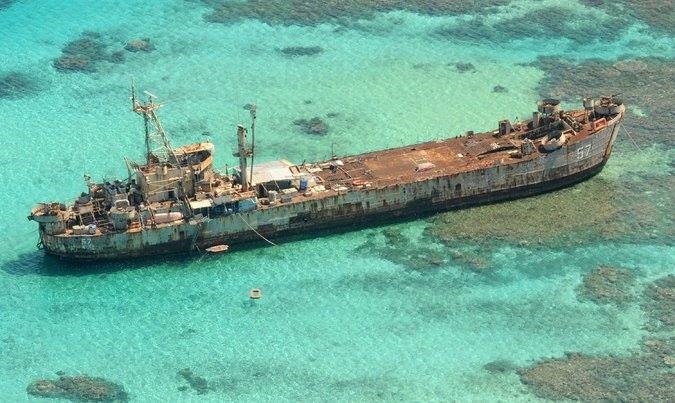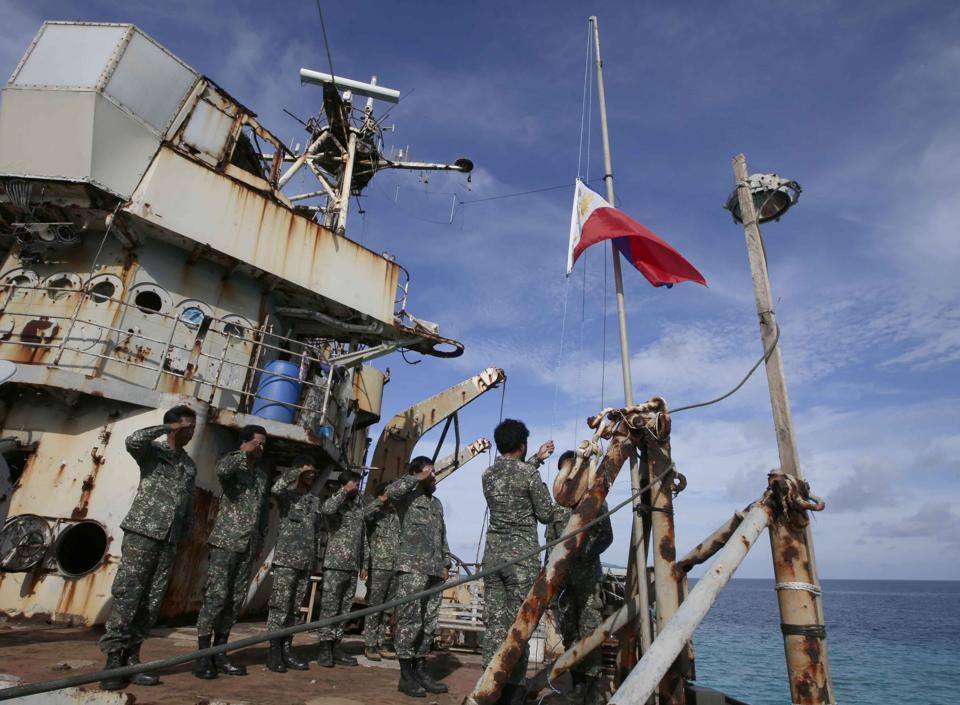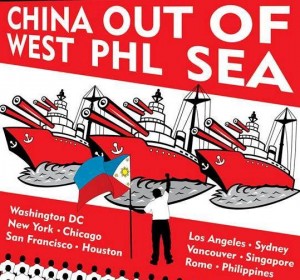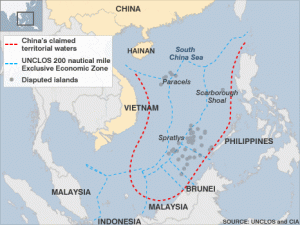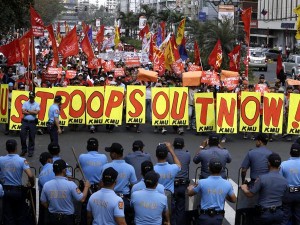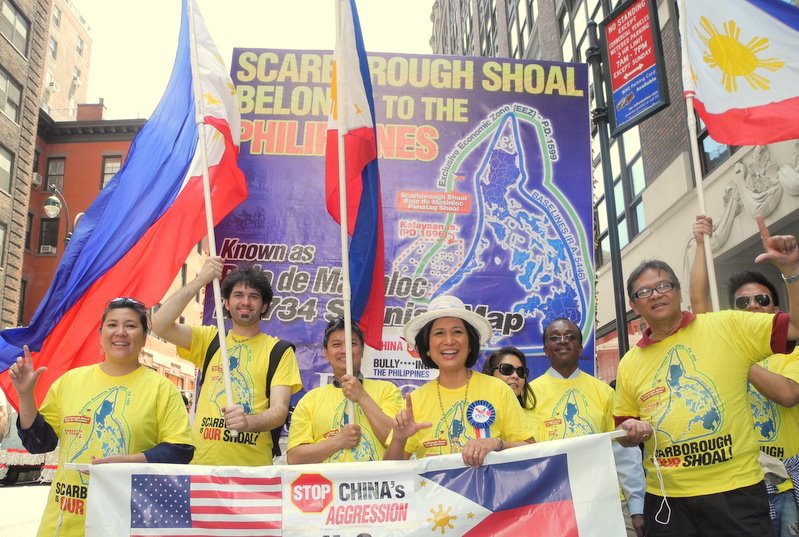Nationalism means opposing China’s imperialism
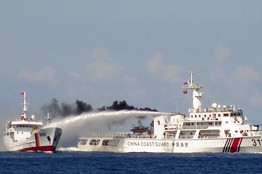
When Vietnam responded by dispatching 30 of its ships to defend its sovereign territory, China used high-powered water cannons to disperse them and even rammed its vessels straight into Vietnamese ships causing damage to the Vietnamese ships and injury to those on board.
“Vietnam cannot accept and resolutely protests this Chinese action,” declared Vietnam Foreign Minister Pham Binh Minh on May 7, 2014. “Vietnam demands that China withdraw the rig HD981 and escort vessels from this area.” While Vietnam wants to solve all territorial disputes with China peacefully, Minh said, Vietnam “will apply all necessary and suitable measures to defend its rights and legitimate interests” in the seas.
Vietnam may have the will to fight but clearly lacks the “suitable” might to defend itself against China. Vietnam is mindful about what happened on March 14, 1988 when four ships of the Chinese People’s Liberation Army Navy (PLAN) landed on Vietnam’s Johnson South Reef and faced Vietnamese defenders on the reef who refused to leave. The Chinese ships fired at will at the sailors and pounded the reef with heavy shells. When the dust settled, several Vietnamese ships were destroyed and 64 Vietnamese sailors lay dead. The Johnson South Reef Massacre was recorded by the Chinese Navy and shown all over China as an example of China’s might.
![China´s massacre in Spratly islands [real footage 1988]](https://i.ytimg.com/vi/Uy2ZrFphSmc/hqdefault.jpg)
China’s most recent attack against its ideological communist ally, Vietnam, is a preview of what the Philippines may expect when China moves a giant oil rig to the Recto Bank which is only 85 nautical miles from Palawan. The US Energy Information Administration (USEIA) estimates that there may be approximately 11 billion barrels (bbl) of oil reserves and 190 trillion cubic feet (tcf) of natural gas reserves in the West Philippine Sea. Ayungin is the gateway to the Recto Bank and China intends to occupy Ayungin Shoal before the end of 2014.
What stand in the way of China’s goal are an old “derelict” Philippine ship, the BRP Sierra Madre, defended by nine Philippine marines, and the recently signed Enhanced Defense Cooperation Agreement (EDCA) between the US and the Philippines.
During his Manila visit, Pres. Obama was repeatedly asked by reporters whether the Mutual Defense Treaty (MDT) will apply in the event that the territorial conflict with China escalates into an armed conflict. Obama did not give a straight forward “yes” answer to which columnist Ellen de Tordesillas commented that the questions “reflected our mendicant mentality and our fantasy about America. But they had to be asked because many Filipinos wanted to hear from the leader of the world’s superpower that he will take care of us if we get clobbered by a neighborhood enemy that is the world’s number two superpower.”
What Pres. Obama did not explain was the structural limitation of the MDT which the Philippines and the US signed on August 30, 1951. The treaty states that “an armed attack on either of the Parties is deemed to include an armed attack on the metropolitan territory of either of the Parties, or on the island territories under its jurisdiction in the Pacific or on its armed forces, public vessels or aircraft in the Pacific”. But in 1951, the Ayungin Shoal, the Scarborough Shoal and the Kalayaan Island Group were not part of the “metropolitan territory” of the Philippines and an attack on those outlying areas may not automatically trigger the “ironclad” MDT.
Does this mean that China can just tow away the BRP Sierra Madre and the US would just stand by and allow it to happen because the MDT does not apply?
China may consider the rusty old ship a “derelict” but the Philippine Department of Foreign Affairs (DFA) does not agree. On March 14, 2014, the DFA stated: “The BRP Sierra Madre, a commissioned Philippine naval vessel, was placed in Ayungin Shoal in 1999 to serve as a permanent Philippine government installation in response to China’s illegal occupation of Mischief Reef (Panganiban Reef) in 1995.”
University of the Philippines Prof. Harry Roque pointed out that because the BRP Sierra Madre is a commissioned ship, China should “rethink” any plans to tow away the Sierra Madre, he said. “Derelict, as it may be, it is subject to full sovereign immunity and any attempt to tow it away from Ayungin may finally trigger the applicability of the US-Philippine Mutual Defense Treaty,” Roque said. This is because the MDT is triggered by an attack on any of its “public vessels”.
China is well aware that the MDT and the EDCA will be operational by “an armed attack”. But China does not intend to launch an “armed attack” on the Ayungin anytime soon. Instead it will employ the “cabbage strategy” that has proved successful in China’s occupation of Mischief Reef, Sabina Shoal and the Scarborough Shoal.
As China’s Major General Zhang Zhaozhong explained it, the strategy involves surrounding the shoal with Chinese vessels “wrapped layer by layer like a cabbage…For those small islands, only a few troopers are able to station on each of them, but there is no food or even drinking water there. If we carry out the ‘cabbage’ strategy, you will not be able to send food and drinking water onto the islands,” Zhang said. The Filipino troops stationed there would be forced to leave and China could then occupy the territory without an “armed attack” triggering the MDT.
China applied this strategy on March 4, 2014 successfully thwarting a bid by the Philippine Navy to replace the marines stationed on the Sierra Madre since November 2013 and to replenish the ship with fresh supplies. But when the Philippine Navy attempted to break the blockade three weeks later, it succeeded.
https://globalnation.inquirer.net/102306/we-treasure-our-sierra-madre
But what happens when the next Philippine ship comes in July to replace the marines stationed there and to provide them with fresh supplies? What happens when the number of Chinese ships are doubled or tripled and the Philippine resupply vessel cannot reach the Ayungin Shoal?
Will the Philippine Navy send more ships and run the risk having them rammed by the Chinese ships? Will ramming a “public vessel” of the Philippines trigger the MDT? While the answer to that question is not known, what is abundantly clear is that China has now replaced the US as the imperialist enemy of the Filipino people.
Times change. To be a Filipino nationalist during the time of Dr. Jose Rizal in the 19th century was to be firmly anti-Spanish colonialist. After the Filipinos overthrew the Spanish colonialists in 1898 and the US thereafter occupied the Philippines and subjugated it into a US colony – slaughtering hundreds of thousands of Filipino patriots in the process – Filipino nationalism meant being anti-US imperialism.
But after the Japanese invaded the Philippines in 1942, Filipino nationalism was transformed to anti-Japan imperialism. After the Japanese imperial army was overthrown by the combined US and Philippine forces, the US granted the Philippines its political independence in 1946. But passage of the Bell Trade Act in the US undermined this independence.
As a condition to receiving any of the $620 million in war damage aid from the US, the Filipino people were required to approve in a plebiscite the “Parity Amendment” granting American citizens the same rights to exploit the natural resources of the country. Of course, the Filipino people had no choice but to approve it, a condition the US did not impose on either of its WW II enemies, Germany or Japan.
To maintain its hegemony over the Philippines, the United States based its largest naval fleet outside US soil at the Subic Naval Base in Olongapo City and its largest air force base outside the US in Clark Air Force Base in Angeles City. With the presence of US troops on Philippine soil, there were thousands of instances where Filipino women were raped by US servicemen and a few Filipinos shot and killed because they were mistaken for “boars”. The US military perpetrators were invariably flown back to the US before they could be tried in the Philippines.
To maintain its military bases in the Philippines to wage its war in Indo-China, the US supported and endorsed the martial law dictatorship of Ferdinand Marcos.
When then US Ambassador to the Philippines Harry Thomas spoke before the Filipino American community in South San Francisco in February of 2012, he was asked about past US support for the Marcos dictatorship. Thomas acknowledged that the US had committed “shameful” acts in the past but he counseled, “Don’t be trapped by history” citing his own personal example as an African American growing up in a South Carolina that had separate toilet facilities for whites and “coloreds”.
What the Filipino people suffered under US rule was nothing compared to what Vietnam endured during the Vietnam War when the US dropped more bombs in that country than were dropped in WW II by all the allied and axis countries combined. And yet, the Vietnamese government is actively exploring the opportunity for the US to set up a US base in Cam Ranh Bay, a former US military base during the Vietnam War.
The Chinese Communists suffered greatly from US military support of their Kuomintang adversaries before and after the Communists triumphed in 1949. And yet when the Soviet Union threatened to invade Chinese border territories in 1968, Mao Zedong did not hesitate to welcome US Pres. Richard Nixon to Beijing and to usher in a new era in US-China relations in 1971. It was a clever move that stopped the Soviet Union from engaging in any further border excursions in the north.
If playing the US card was good enough for China and is good enough for Vietnam, why would it not be good enough for the Philippines?
Is it because Filipino nationalists are more principled? At the 2006 White House Correspondents’ Dinner, Stephen Colbert described Pres. George W. Bush as a “principled man -the kind of man who believes on Wednesday what he believed on Monday regardless of what happened on Tuesday.”
Many Filipino nationalists are in danger of being as “principled” as Pres. Bush. They believe that US imperialism is the main enemy of Filipino nationalism today just as they believed it the other day regardless of what happened yesterday.
When Pres. Obama visited the Philippines early this month, many of the leftist activists unfurled banners that may as well have been used during the First Quarter Storm of 1970 protesting US imperialist domination of the Philippine economy (“US troops out now!”). That was “the other day”.
What happened “yesterday” – specifically during the administration of Pres. Gloria Macapagal-Arroyo – was that 26 Chinese corporations registered in the Philippines to mine for gold, iron ore, nickel, copper, manganese, lead, zinc, chromate and cobalt. They operate in 16 provinces in the Philippines: Cagayan, Benguet, Zambales, Camarines Norte, Camarines Sur, Palawan, Leyte, Eastern Samar, Bohol, Cebu, Misamis Oriental, Davao Oriental, Surigao del Norte, Sultan Kudarat, Zamboanga del Norte and Zamboanga del Sur. They are all furiously extracting the natural resources of the Philippines while violating Philippine labor and environmental laws.
https://globalnation.inquirer.net/59379/chinas-mining-occupation-of-the-philippines
China has now set its sights on the Recto Bank and will seize it by force if necessary. Playing “the US card” is the best chance the Philippines has of defending its territorial rights within its 200 mile EEZ. But there are pro-China activists in the far left who will do everything they can to oppose the EDCA and prevent US troops and ships from being stationed in the Philippines simply because of what the US did in the past.
When the US Pinoys for Good Governance organized a rally in front of the China Consulate in San Francisco in May of 2012, Raquel Redondiez, the national chair of Gabriela USA and former Secretary-General of Bayan USA, told Balitang America reporter Henni Espinosa on May 9, 2012 that her group opposed Filipino global protest actions against China because, she said, it was a conflict between siblings and “it will only worsen the conflict between China and the Philippines.”
“China is not the true bully in this standoff,” Redondiez asserted. “The China threat is being used by the US to actually further trample on our national sovereignty.”
Many of these activists like Redondiez may find a kindred soul in Gen. Artemio Ricarte, the Filipino revolutionary leader who refused to take an oath of allegiance to the US after he was captured by the Americans in 1900 and who was exiled to Guam along with Apolinario Mabini. When they were brought back to the Philippines in 1903, Mabini pledged allegiance to the US but Ricarte refused to do so. He exiled himself to Yokohama, Japan where he flew the Philippine flag every day yearning for the time when he could return back to a Philippines liberated from US imperialism.
The opportunity he had been waiting for finally came in 1942 when he returned to the Philippines with the Japanese Imperial Army. To assist the Japanese “liberators”, Ricarte formed the Makapili, a pro-Japanese organization during World War II which was used to root out guerrillas. Be careful what you wish for.
Will our anti-US imperialist activists, our modern day Ricartistas, support China’s imperialist invasion of Ayungin Shoal and Recto Bank?
(Rodel Rodis is the president of US Pinoys for Good Governance and works in his law office at 2429 Ocean Avenue, San Francisco, CA 94127. He can be reached by email at Rodel50@gmail.com or by phone at 415.334.7800).
For comprehensive coverage, in-depth analysis, visit our special page for West Philippine Sea updates. Stay informed with articles, videos, and expert opinions.
